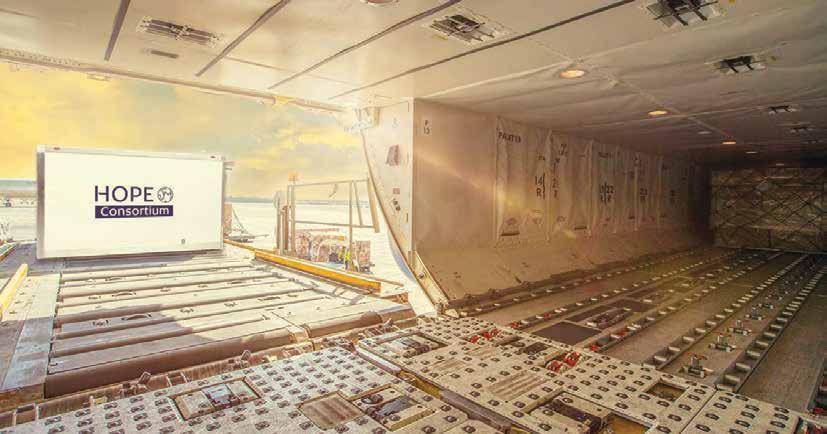
4 minute read
DHL Express
DHL EXPRESS UAE ranks amongst world’s Top 5 most globally connected countries
DHL Global Connectedness Index 2020 signals recovery of globalization following COVID-19 setback
The UAE has emerged as one of the top five most globally connected countries in the world according to the recently released DHL Global Connectedness Index 2020.
Now in its seventh edition, the report compiled in collaboration with DHL and the NYU Stern School of Business provides a comprehensive assessment of globalization during the Covid-19 pandemic. It tracks international flows of trade, capital, information and people across 169 countries and territories, finding that the UAE, along with the Netherlands, Singapore, Belgium and Ireland, lead the global ranks.
After holding steady in 2019, current forecasts imply that the index will fall significantly in 2020 due to the distancing effects of Covvid-19 on societies, such as closed borders, travel bans and grounded passenger airlines.
Trade and capital flows have already started to recover and international data flows surged during the spreading pandemic as in-person contact went into the online world, boosting international internet traffic, phone calls and e-commerce.
“Connected supply chains and logistics networks play an essential role in keeping the world running and stabilizing globalization especially at a time of a crisis that spans our globe. This reminds us of the


need to stay prepared for any challenge,” stressed John Pearson, CEO, DHL Express.
“The UAE has remained resilient to the global pandemic, prompted by the government’s vigilant efforts to contain the spread very early on and minimize the country’s health, safety and economic impact,” commented Nour Suliman, CEO, DHL Express MENA.
“This report demonstrates both the dangers of a world where critical linkages break down and the urgent need for more effective cooperation in the face of global challenges,” remarked GCI lead author Steven A. Altman, Senior Research Scholar and Director of the DHL Initiative on Globalization at the NYU Stern School of Business.
Digital flows surging, trade and capital flows recovering, people flows plummeting
Predictably, lockdowns and travel bans to curb the spread of the virus have led to an unprecedented collapse of people flows in 2020. The number of people traveling to foreign countries is on track to fall 70% in 2020, according to the latest UN forecast. International tourism may not return to its pre-pandemic level until 2023.
In contrast, trade, capital, and information flows have held up surprisingly well. International trade has rebounded strongly after a sharp plunge at the onset of the pandemic and remains a vital backbone for economies worldwide.
Rigorous planning and testing to ensure supply chain supports vaccine’s stringent temperature requirements
DHL, the leading global brand in the logistics industry recently announced the successful delivery of the first batch of COVID-19 vaccines to Singapore.
The vaccines arrived on a cargo flight from Brussels, Belgium to Singapore. Temperature trackers equipped with sophisticated GPS are also packed within each thermal shipper box to provide full visibility throughout the shipment’s entire journey.
DHL Global Forwarding arranged for the collection of the vaccines from the manufacturing site in Puurs, Belgium where the cargo was accompanied by security escorts on the road to the Brussels International Airport.
The cargo arrived at Singapore’s Changi International Airport on where DHL handled the customs clearance and final delivery to a designated location in Singapore. The company will also handle the return of these special shipper boxes to Europe.
Throughout the journey, the vaccine shipments were tracked by DHL. “Every effort was made to ensure the vaccines are delivered within the fastest possible time, ensuring the quality, safety and security of these critical shipments,” emphasized Kelvin Leung, CEO, DHL Global Forwarding Asia Pacific.
More than 9,000 specialists work across DHL’s dedicated global network so that pharmaceutical, medical devices, clinical trials and research organizations, wholesalers and distributors, as well as hospitals and healthcare providers are connected across the value chain and through digitalization, from clinical trials to point of care, and every step in between, according to a corporate press communiqué.
DHL’s portfolio for the healthcare industry includes 150+ pharmacists, 20+ clinical trials depots, 100+ certified stations, 160+ GDPqualified warehouses, 15+ GMP-certified sites, 135+ medical express sites, and a time-definite international express network covering 220 countries and territories.
On a global scale, logistics providers are challenged to establish medical supply chains rapidly to deliver vaccines of unprecedented amount of more than 10bn doses worldwide -- also in regions with less developed logistics infrastructure, where approximately 3bn people live.
To provide global coverage of the next two years, DHL estimated in its vaccine whitepaper report that up to 200,000 pallet shippers and 15mn cooling boxes as well as 15,000 flights will be required across the various supply chain setups.




